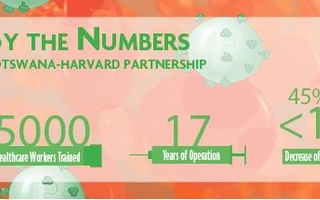In describing the future of the centers, Dominguez says that he expects them to partner with a local nongovernmental organization, drawing a parallel to Harvard Medical School’s relationship with its affiliate hospitals.
“We’ve committed ourselves to do the capacity building necessary so we can turn all assets over to a nongovernmental organization in Botswana that will ultimately receive the funding from the federal government,” Dominguez says.
LOCALIZING CARE
Max L. Dougherty ’10 could not help feeling slightly panicky when he first arrived in Botswana to work in Essex’s lab last spring.
“I didn’t really know what to expect,” Dougherty says. “What struck me is the dryness of the land—any sort of open space is just dirt.”
“It’s in the desert,” Dougherty adds. “The country just looks very brown.”
But once Dougherty joined Essex’s lab, the foreignness of the African country began to fade.
“When I first got there I was impressed,” Dougherty says. “It looked like a lab you would expect to see anywhere.”
Interviews with students who worked with Essex last spring paint a picture of a close-knit scientific community holed up in the lab, decoding genomes, analyzing drug resistance, and researching HIV transmission from infected mothers to their children.
Carlos C. Becerril ’10 recalls working late in the lab, analyzing the transmission of drug-resistant HIV.
His research yielded results—the drug-resistant HIV strain typically found in Botswana is usually not transferable. Botswanans infected with HIV can begin treatment immediately upon diagnosis, since the strain they contracted is likely not to be drug-resistant, which would require a different course of treatment, Becerill says.
This finding means that drugs can be delivered faster, increasing health practitioners’ success rates.
“Now that I look back, I’m happy that I spent as much time in the lab as I did,” Becerill says. “It showed me that if you put the work into it, you can really accomplish something.”
Several Botswanans work in Essex’s lab, which is located next door to the capital city’s main hospital, and Essex is quick to emphasize that his facility is not meant to provide care for area residents, but to conduct research.
Health clinics in the developing world face the challenge of striking a balance between bringing in outside experts and building up local expertise to set up long-term care structures.
Read more in News
Ellison Takes Winding Path to CollegeRecommended Articles
-
Drew Goes on SafariThis November, President Drew G. Faust will be traveling to South Africa and Botswana. To help our girl out, FM ...
-
 AIDS Leads to Stigma on Campus
AIDS Leads to Stigma on Campus -
HSPH Awarded HIV Prevention GrantThe Centers for Disease Control and Prevention have awarded a four-year $20 million grant to researchers at the School of Public Health to study HIV prevention in Botswana as part of a President’s Emergency Plan for AIDS Relief (PEPFAR) initiative.
-
 Harvard Partnership Fights HIV/AIDS in Botswana
Harvard Partnership Fights HIV/AIDS in Botswana -
 One World, One Dream
One World, One Dream -
Shorenstein Center Names Four Spring FellowsThe fellows will spend the semester researching and writing a paper on a topic of their choice.













